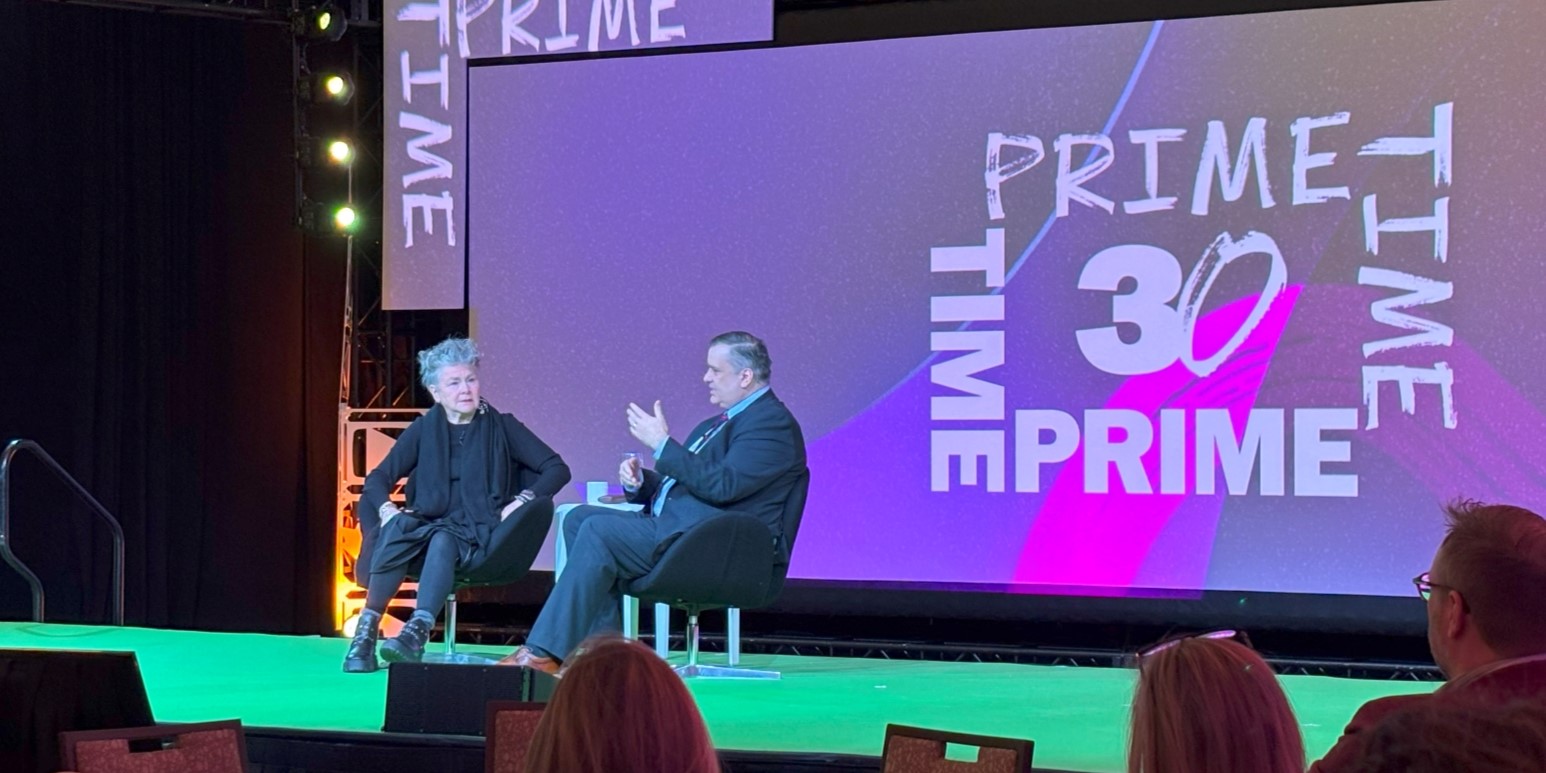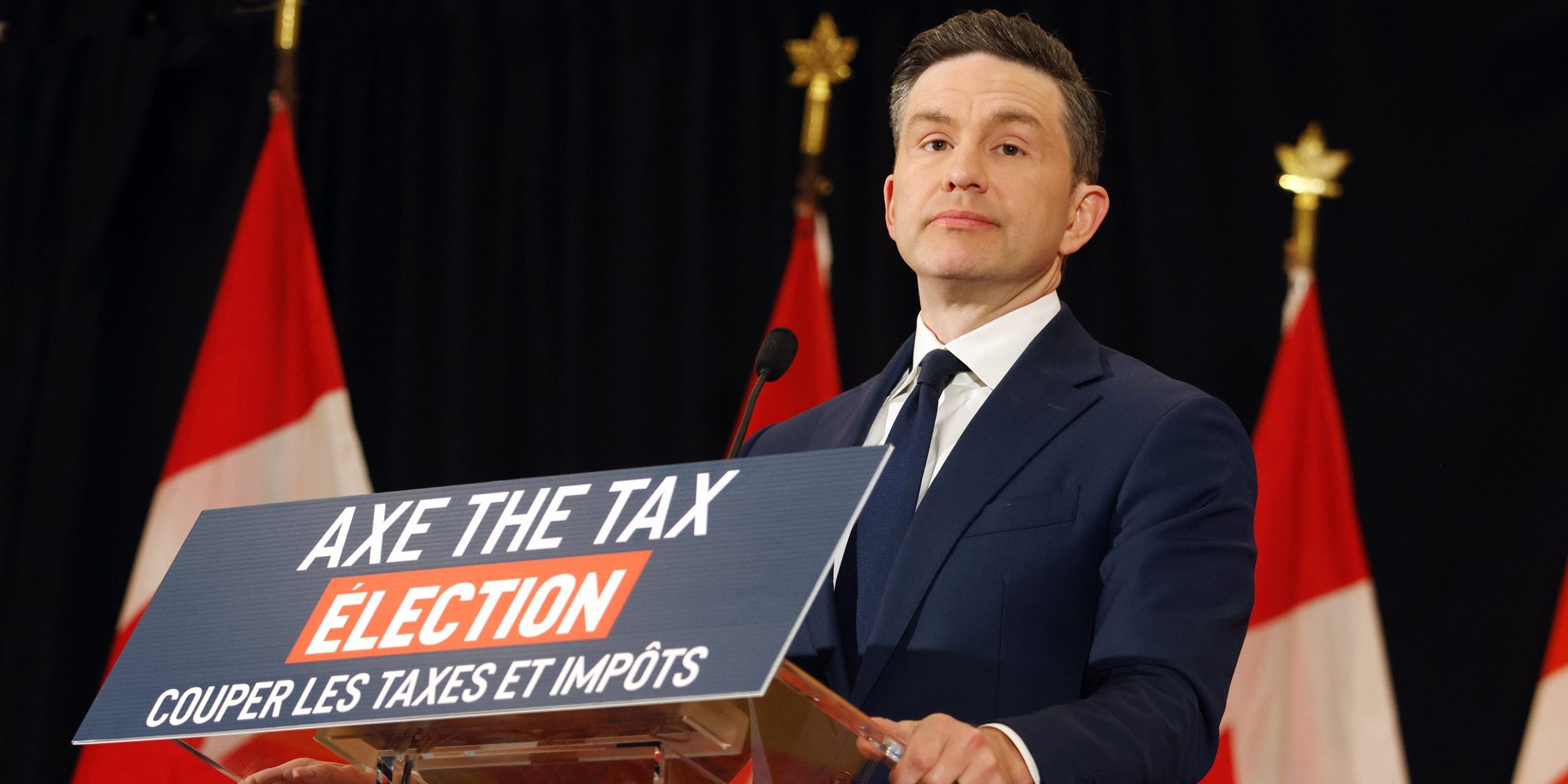Former Conservative Heritage Minister urges Tories to recognize importance of creative sector, CBC
Broadcast | 02/05/2025 6:03 pm EST
With a federal election looming, a former politician is urging the Canadian creative sector to work harder to inform members of Parliament about their industry’s importance in keeping the country together, inspiring its youth, and generating economic opportunities.
Former Conservative Minister of Canadian Heritage James Moore, who served during the Stephen Harper government, shared the message with delegates during the Canadian Media Producers Association’s (CMPA) annual Prime Time conference last week. He was joined by comedian and This Hour Has 22 Minutes veteran Mary Walsh.
Acknowledging the likelihood of a federal election in the coming months, Walsh and Moore discussed the implications for Canada’s production sector if the country were to see a change in government. Conservative leader Pierre Poilievre has vowed to defund CBC/Radio-Canada if he becomes Prime Minister.
That plan raises questions about other parts of the Canadian cultural sector, said Moore, noting that “Conservatives don’t talk about the cultural space at all.”

“Because there’s this din and this quiet and the only thing that gets said is ‘defund the CBC,’ then you say, ‘well, it must tumble down,’” Moore said, saying it leaves people wondering what the party’s stance is on defunding museums, community programs, “support for artists globally,” the performing arts, and more.
“What else? Where does the line hold?” he asked, calling on the party to clarify its position on other parts of Canada’s cultural industries beyond defunding the CBC.
The Conservative Party did not respond to The Wire Report’s request for comment.
Cultural sector holds the country together, says Moore
“The most important mission of any Canadian Prime Minister is to keep the country united,” said Moore. He argued that Canada has “always been divided,” whether it is “east and west, north and south, French and English, Protestant and Catholic in the early days, Indigenous and not, newcomers and multi-generational Canadians, all that.”
“Keeping this country united is a really complicated task … and when you have stresses … that pull on the fabric of the unity of the country, Canadians will pivot and look to some [cultural] institutions – imperfect or not, CBC or not –” to share stories that allow them to “appreciate what we’ve got as a country,” explained Moore. It is a message that he hopes the Conservatives understand.
“The CBC is not some elixir that fixes all of that and binds the country together,” acknowledged Moore, “but running in the other direction doesn’t help either.”
“The country doesn’t survive unless we have empathy and understanding of each other’s shared history, shared grievance, shared hopes and aspirations for the future. And that’s why we need the cultural sector to tell our stories.”
READ MORE:
– Incoming CBC head non-committal on bonuses as she takes the helm, pledges to listen to Canadians
– CBC expands local news programming following Google news act exemption
– CBC CEO Catherine Tait not worried for broadcaster’s longevity
Moore encouraged conference attendees to urge Conservatives to recognize that the creative sector should be seen by policy-makers as an essential need for Canadians.
“The creative sector is not a ‘nice to have,’ but it’s a fundamental element of nation building and a fundamental element of an economic opportunity for the country,” he stated.
According to data from Statistics Canada, cultural industries contributed $58.5 billion to the country’s GDP in 2022, accounting for 2.2 per cent of overall GDP. That year, the sector also provided 648,825 jobs, representing 3.3 per cent of all jobs in Canada.
Additionally, according to the Department of Canadian Heritage, the country’s exports of creative goods and services in 2020 was valued at $19.4 billion.
“We are a creative country, and we sell to the world way beyond what our population would mandate,” said Moore, highlighting that more Canadians work in the arts, culture, and creative sectors in Canada than work in the forestry and mining sectors combined. According to StatCan, in 2022 there were about 328,100 people employed in the forestry, fishing, mining, and natural resources industries.
“The CBC will go through whatever it is the Conservatives have designed,” said Moore. “I’m not quite sure what that is and frankly, I’m not sure that they’ve quite aligned with what that is…” he added, noting that the Conservatives’ plans for the public broadcaster are not entirely clear, particularly when it comes to what it wants to happen to the French arm and how much the proposed cuts would supposedly benefit Canada’s finances.
Poilievre has previously stated that he wants to strip the CBC’s English services of federal funding while maintaining some support for its French services. However, according to a statement from CBC/Radio-Canada’s new CEO Marie-Philippe Bouchard last month on The Current, “there’s a serious risk that it will, in fact, cripple not only the English services, but also the French service,” due to the large amount of resources the two sides share.
According to the CBC’s financial reports and the 2024 federal budget, CBC/Radio-Canada received approximately $1.4 billion in government funding last year.
“The cost of servicing our national debt is roughly $60 billion per year, maybe a little under. Which is to say, if you 100 per cent defunded the CBC, you would pay for the cost of servicing Canada’s national debt for five and a half to six days,” said Moore.
“You have to be very precise with these things, and slogans don’t get you there.”
“Whatever bias and animus exists from Pierre Poilievre and current Conservatives against the CBC, the challenge is not to let that spill over from the CBC and hit the broader cultural sector,” he stated.
CBC is vital ‘partner’ for the cultural sector
For some in the sector, however, the importance of CBC to the rest of the industry cannot be understated.
“We need [the CBC], they’re the largest commissioner of Canadian content,” asserted Blue Ant Studios co-president Mark Bishop on a panel later that day. “We need them now and we’ll need them in the future.”
Bishop explained how the CBC, through partnerships and commissions, has allowed Canadian companies to take risks incubating and experimenting with new ideas.
“It’s a sandbox where we can tell great stories from coast to coast. And if we lose that, we lose an incredible voice and an incredible opportunity to have a partner,” he said.
“They don’t do everything right, nobody does – and there’s room to be fixed, for sure, and everyone has a different opinion and there’ll be lots of time for that – but we need to make sure that they’re a part of this ecosystem, because we need that strong Canadian voice. We need that partner, we need that investor to help support and build content for our industry,” Bishop concluded.
Industry should prepare for cuts in federal supports, says senator
Senator Andrew Cardozo of the Progressive Senate Group warned the industry to prepare for the worst, noting that it is not just the CBC that is on the chopping block, but potentially also Bill C-18, the Online News Act, as well as Bill C-11, the Online Streaming Act.
“A lot of the policies that we have been following for a while are under threat,” he said in an interview with The Wire Report. “If there’s a change in government, [the Conservatives] have a very different philosophy about things like the CBC, C-18, and support for the broadcasting industry.”
The news act requires major online platforms that provide users with access to news articles, such as search engines and social media sites, to negotiate commercial agreements that compensate Canadian news organizations. Google received a five-year exemption from the requirement after agreeing to contribute $100 million to news organizations collectively. The streaming act is aimed at updating the broadcasting regulatory framework to rope in online streaming companies, including requiring them to contribute a portion of their revenues towards Canadian productions.
The Conservative party has been “very clear that they will get rid of the CBC and they will get rid of C-18 and C-11,” Cardozo continued. “So all those kinds of policies will be gone, and that changes our system.”
Cardozo discussed the matter on another Prime Time panel focused on different countries’ approaches to modernizing their regulatory regimes for the streaming era.
READ MORE:
– Political strife, production cuts challenge independent producers: CMPA head
– CMPA head optimistic about state of broadcast industry at Prime Time’s 30th edition
“We’re entering a very difficult period for this industry and for a lot of industries,” said Cardozo, looking at the different potential outcomes of an election. No matter which party takes the mantle of leadership in Canada, cuts in federal funding are coming regardless, he said.
“With the Liberals you’re going to get the status quo, minus some millions of dollars,” he stated. “They haven’t said what, but they’re basically going to be cutting everything, and there are no sacred cows.”
Cuts under the Conservatives would be much more drastic, he expects. The senator described “an impoverished” CBC and the elimination of all federal funding for newspapers and broadcasters. He also pointed to an end to diversity, equity and inclusion (DEI) policies in Canada.
“I haven’t seen the Conservative Party in any way talk about improving, defending the range of cultural policies,” said Cardozo, echoing Moore’s earlier statements.

Cardozo also encouraged delegates from the creative sector to make themselves known to MPs and help them understand how their funding and policy decisions affect them.
“The industry could do a really aggressive program of informing MPs by showing them what they do across the country,” said Cardozo.
He emphasized the importance of demonstrating the creative sector’s role in all regions of the country, “not [just] some downtown Toronto [or] Montreal elite group.”
“Take every Conservative riding and talk to their candidates. Don’t wait for the election, talk to their candidates now.”
Despite the challenges of a potential change in government in Canada, a new administration in the United States, and disputes over the Online Streaming Act, CMPA senior vice president of industry and policy Alain Strati is hopeful.
“It’s never been easy,” he said on the same panel as Cardozo.
Opportunities might come up to “change some things,” but it will be critical to maintain the broadcasting framework’s “fundamental principles,” which is to have “Canadian content from Canadians” and an established “perspective by Canadians and for Canadians,” said Strati.
“There needs to be that continuation and we’ve done it since the CBC was established and CRTC was established, since we went through the structural hearings [on priority programming and programs] of national interest, all the way up to Bill C-11. There’s no doubt that we will continue.”

